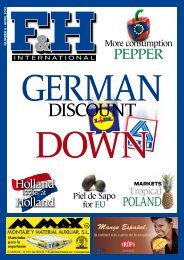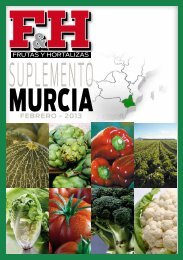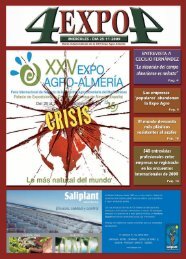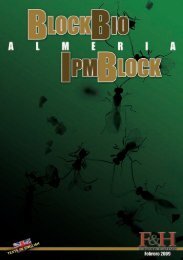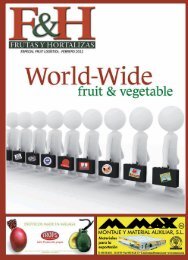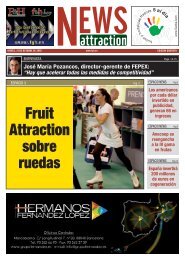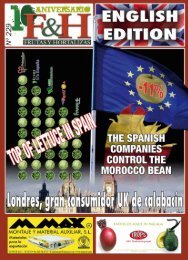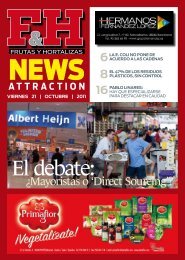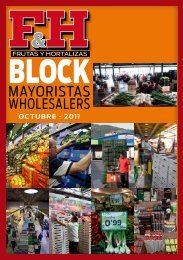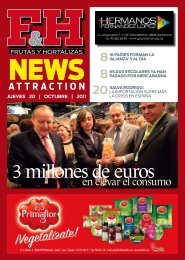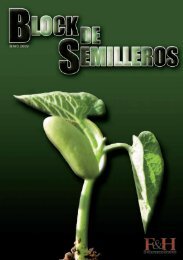Reporting On... - Revista F&H
Reporting On... - Revista F&H
Reporting On... - Revista F&H
You also want an ePaper? Increase the reach of your titles
YUMPU automatically turns print PDFs into web optimized ePapers that Google loves.
aLMERia: 14 pER CENt LEss<br />
The last horticultural<br />
campaign of Almería finished<br />
with negative results<br />
of the value, with a<br />
fall of 14% respecting to<br />
the previous campaign,<br />
although with an increase<br />
of 4% of the commercialization.<br />
Throughout the period<br />
2010/2011 2.2 million<br />
tons of fruits and vegetables<br />
with a value in origin<br />
of 1,111 million Euros<br />
were commercialized.<br />
The value of all the products<br />
decreased except the<br />
pepper that increased<br />
9%, continuing the creasing<br />
tendency of the last<br />
campaign.<br />
The value of the courgette<br />
was the worst of the vegetables<br />
decreasing 40%,<br />
whereas the cucumber<br />
also decreased 8% but<br />
its production increased<br />
8%.<br />
The prices of the aubergine<br />
decreased 14% with<br />
a production similar to<br />
the last campaign. The<br />
production of the tomato<br />
also increased 6% and<br />
the value decreased 17<br />
per cent.<br />
The spring campaign was<br />
not better and the value<br />
of the melon decreased<br />
16 per cent but also the<br />
production decreased 10<br />
per cent.<br />
The watermelon had better<br />
behavior increasing<br />
its value 59 per cent, although<br />
the production<br />
increased 11 per cent. The<br />
bean also had good behavior.<br />
ISRAEL wiLL REaCh<br />
2,500 hECtaREs OF pEppER<br />
Israel will have during<br />
the present campaign<br />
2,500 hectares of pepper,<br />
which means an increase<br />
of 200 hectares respecting<br />
to the last campaign.<br />
This increase is caused<br />
mainly by the change of<br />
the crops of tomato into<br />
pepper crops and, also<br />
the new plantations in<br />
the Valley of Arava.<br />
The producers of Israel<br />
think that the possibilities<br />
of the pepper are<br />
better than the tomato<br />
because of the hard competition<br />
between Spain<br />
and Morocco to export<br />
to the European market.<br />
The production of Israel<br />
during the last campaign<br />
was 175,000 tons, standing<br />
out the red sweet pepper,<br />
of which 50,000 tons<br />
were exported to the EU.<br />
The tendency for the<br />
present campaign is that<br />
the shipments of pepper<br />
from Israel to Europe are<br />
increased through the<br />
German way.<br />
During the campaign<br />
2008-2009 the surface<br />
increased 15 per cent but<br />
the possibilities of new<br />
growth are determined<br />
by the lack of surface and<br />
water for the development<br />
of the crop of pepper,<br />
reason why some analysts<br />
consider that Israel<br />
is near its limits of surface<br />
of this product.<br />
Tendencies<br />
MURCia:<br />
BaD<br />
SITUATION<br />
FOR THE<br />
SwEET<br />
PEPPER<br />
The sweet pepper of spring<br />
is not working well in Spain.<br />
The production of Murcia<br />
and Alicante has been decreasing<br />
for two years. The<br />
causes have been the low<br />
prices and the little margin<br />
of maneuver.<br />
Murcia and Alicante are looking<br />
for a place between the<br />
end of the campaign of Almería<br />
(Spain) and the beginning<br />
of Westland (Holland),<br />
but in the both last years<br />
the campaign of Almería<br />
has been longer thanks to<br />
the biological control and<br />
Holland has started its<br />
campaign of sweet pepper<br />
earlier thanks to the technological<br />
development.<br />
The surface of pepper<br />
during the last campaign<br />
reached 1,700 hectares, of<br />
which 1,000 hectares were<br />
of elongated pepper and the<br />
rest were of sweet pepper.<br />
The prices of the campaign<br />
2011 were below 60 cents of<br />
Euro for sweet pepper and 15<br />
per cent more for the elongated<br />
pepper, which “is causing<br />
that some producers of pepper<br />
came back to the Spanish<br />
market”, Angel García of<br />
Soltir, affirms.<br />
Although it is still soon to<br />
anticipate the production<br />
of 2012, some seeds companies<br />
interested in the sweet<br />
pepper sector of spring in<br />
Murcia-Alicante anticipate<br />
a decrease 10-15 per cent of<br />
the surface, which means a<br />
total surface of around 600<br />
hectares into the hands of<br />
the Surinver, Gregal, San<br />
Cayetano and Hortamira<br />
companies.<br />
F&H International 1 • November 2011<br />
11




